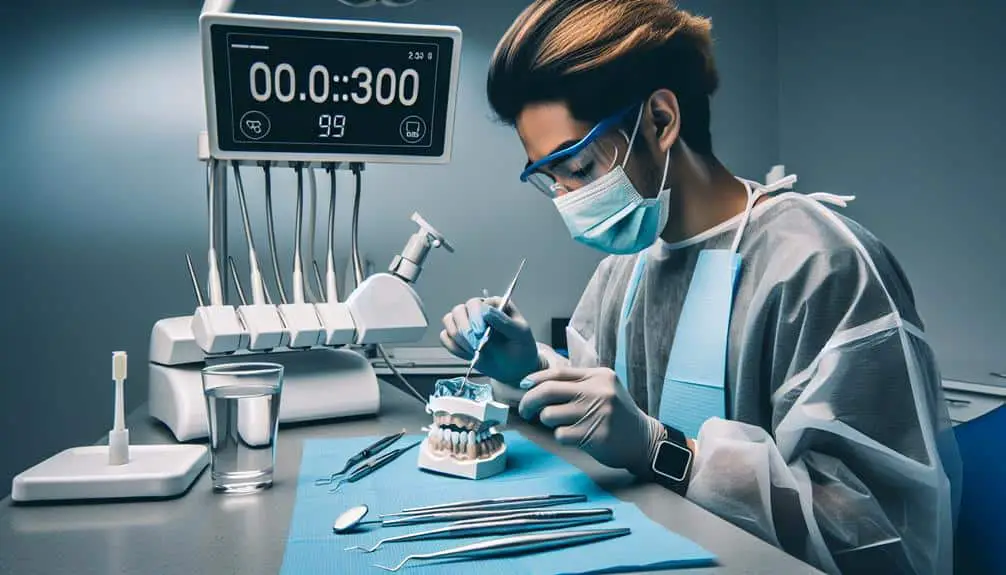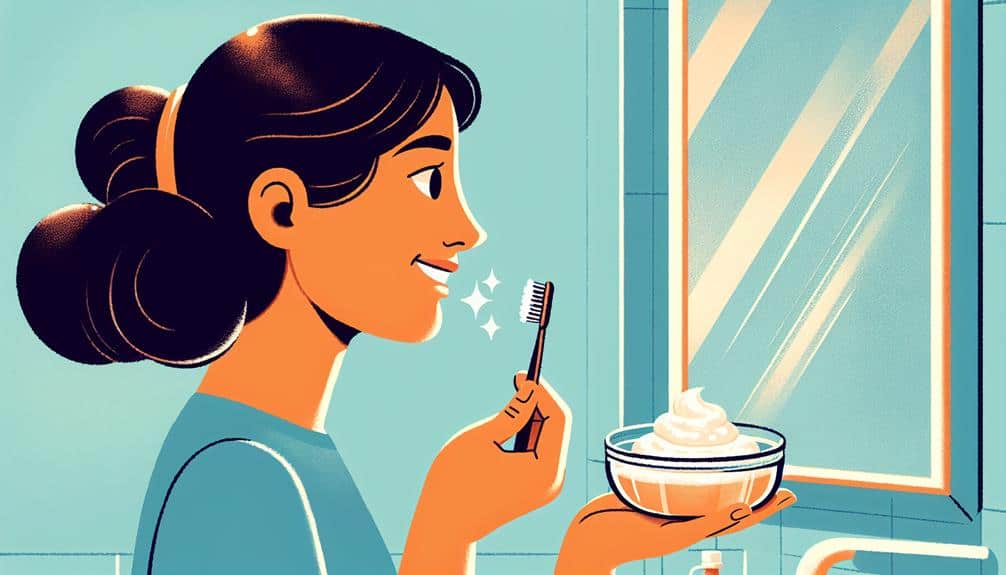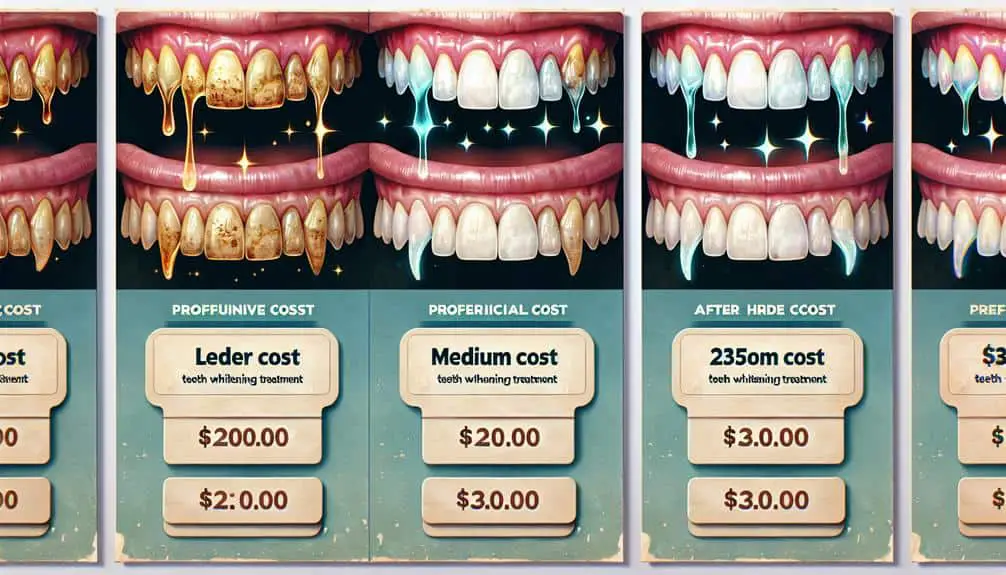When whitening your teeth, consulting with a dental professional is vital for personalized advice and safe treatment. They'll assess your oral health, identify any issues, and guide you on the best approach. Be cautious not to overdo it, as excessive whitening can harm your enamel and cause gum irritation. Additionally, address sensitivity concerns, follow proper post-treatment care, and monitor any signs of discoloration reappearance. Prioritizing these precautions will help achieve a brighter smile while safeguarding your dental health.
Key Points
- Consult a dental professional before whitening to assess oral health and choose the safest approach.
- Follow recommended product guidelines to prevent enamel damage and gum irritation.
- Address post-whitening sensitivity with desensitizing toothpaste and avoid extreme temperatures.
- Maintain results by using whitening toothpaste, avoiding staining foods, and attending regular dental check-ups.
- Monitor tooth discoloration regularly, practice good oral hygiene, and act promptly if discoloration reappears.
Importance of Professional Consultation
Before commencing any teeth whitening treatment, it's crucial to consult with a dental professional to guarantee safety and effectiveness. A consultation benefits you by providing expert advice tailored to your specific dental needs. Dental professionals have the expertise to assess your oral health and determine the most suitable whitening approach for you. They can identify any underlying issues that may impact the whitening process, such as cavities or gum disease, ensuring that your treatment is both safe and efficient.
Expert advice from a dental professional can also help you avoid potential pitfalls. They can recommend the best whitening method based on factors like the level of discoloration, sensitivity concerns, and desired outcome. This personalized guidance ensures that you achieve optimal results without causing harm to your teeth or gums. Additionally, consulting with a professional allows you to ask questions, address any uncertainties, and receive proper instructions on post-whitening care. Overall, a consultation sets the foundation for a successful teeth whitening experience by putting your oral health first.
Potential Risks of Overuse
Tooth whitening treatments can pose potential risks if used excessively, leading to adverse effects on oral health. One of the risks associated with overuse is enamel damage. Enamel is the outer layer of the tooth that protects it from decay and sensitivity. Excessive whitening can weaken the enamel, making it more prone to erosion and damage over time. To avoid enamel damage, it's important to follow the recommended guidelines for whitening treatments and not exceed the usage instructions provided.
Another risk of overusing teeth whitening products is gum irritation. The chemicals in whitening agents can irritate the gums, causing redness, swelling, or even discomfort. To manage gum irritation, it's essential to apply the whitening products carefully, avoiding contact with the gums as much as possible. Additionally, using products specifically designed to protect the gums during the whitening process can help minimize the risk of irritation. By being mindful of these risks and taking necessary precautions, you can achieve a brighter smile without compromising your oral health.
Understanding Sensitivity Issues
Are you experiencing discomfort when consuming hot or cold foods and drinks? Sensitivity to temperature changes could be a sign of underlying dental issues related to teeth whitening treatments. To guarantee a smooth teeth whitening experience, it's important to grasp sensitivity issues and take necessary precautions.
Here are some key points to keep in mind:
- Pre Treatment Care: Before undergoing any teeth whitening procedure, it's vital to consult with your dentist. They can assess your oral health and recommend the most appropriate whitening method based on your dental condition.
- Post Treatment Discomfort: It's common to experience some level of tooth sensitivity after a whitening treatment. To alleviate discomfort, you can use desensitizing toothpaste recommended by your dentist. Additionally, avoid consuming extremely hot or cold foods and beverages immediately after the procedure to minimize sensitivity.
Proper Maintenance After Treatment
If you've recently undergone a teeth whitening treatment and want to maintain your brighter smile, implementing proper post-treatment care is vital. Post-treatment care plays an important role in ensuring the long-term effects of your teeth whitening procedure.
After your treatment, it's essential to follow specific guidelines to maximize the results and prevent discoloration. First and foremost, avoid consuming dark-colored foods and beverages such as coffee, tea, and red wine, as these can stain your teeth. Additionally, refrain from smoking or using tobacco products as they can also lead to discoloration.
Brushing your teeth at least twice a day with a whitening toothpaste can help maintain your results by preventing new stains from forming. Moreover, regular dental check-ups and cleanings can aid in monitoring your oral health and addressing any concerns promptly.
Monitoring Discoloration Reappearance
Regularly assess the appearance of your teeth to detect any signs of discoloration reappearing after a whitening treatment. It's essential to monitor the effectiveness of your whitening treatment and take action promptly if you notice any discoloration returning.
To prevent stains and maintain your bright smile, consider the following:
- Maintain Good Oral Hygiene: Brush your teeth at least twice a day and floss regularly to prevent the buildup of plaque and stains that can diminish the effects of whitening treatments.
- Limit Staining Foods and Beverages: Avoid or minimize consumption of foods and drinks that are known to cause stains, such as coffee, tea, red wine, and berries, to prolong the results of your whitening treatment.
- Consult Your Dentist: Schedule regular check-ups with your dentist to discuss any concerns about discoloration reappearing and to explore additional whitening options or touch-up treatments to maintain a bright smile.
Frequently Asked Questions
Can Teeth Whitening Products Be Used on Dental Restorations Such as Crowns or Veneers?
You can't use teeth whitening products on dental restorations like crowns or veneers. These materials don't change color with whitening treatments. Consult your dentist for safe options to maintain a uniform smile.
Is It Safe to Whiten Teeth During Pregnancy or While Breastfeeding?
During pregnancy, it's best to avoid teeth whitening products due to concerns about potential harm to the fetus. While breastfeeding, tooth sensitivity may increase, so consult your dentist for safe options if considering whitening treatments.
How Long Should I Wait Before Consuming Foods or Drinks That May Stain My Teeth After a Whitening Treatment?
After a teeth whitening treatment, wait at least 24-48 hours before consuming foods or beverages that may stain your teeth. Opt for a stain-prevention diet by avoiding dark-colored drinks like coffee and red wine to maintain your bright smile.
Are There Any Natural Remedies or DIY Methods for Teeth Whitening That Are Safe and Effective?
For safe and effective teeth whitening, consider natural remedies like baking soda and hydrogen peroxide. DIY methods can be gentle, but always consult your dentist first. Safety first to avoid unwanted side effects.
What Should I Do if I Experience Severe Tooth Sensitivity or Gum Irritation After Using a Whitening Product?
If you experience severe tooth sensitivity or gum irritation after using a whitening product, try desensitizing toothpaste, avoid hot or cold foods, and apply fluoride gel. Home remedies like a saltwater rinse can provide relief and preventive measures for future use.



